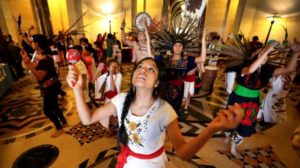
We have said it all along and the momentum is picking up!
Earlier this month, a committee of the Los Angeles City Council backed a plan to reframe Columbus Day as Indigenous Peoples Day, following the lead of Berkeley, Denver, Phoenix and the state of Vermont. The proposal now goes to the full council. It should vote yes, and the sooner the better. Giving Columbus Day a reset would represent a necessary reckoning with the nuances of American identity and history.
Columbus, after all, did not discover America, any more than Amerigo Vespucci or Sir Francis Drake did. It was here all along, home to a wide array of cultures and civilizations. The Taos Pueblo, in New Mexico, was founded more than 1,000 years ago — that is, about 500 years before Columbus “found” his first Caribbean island. Along with Acoma Pueblo, Taos is cited as the oldest continuously occupied settlement in the United States.
Native tribes were virtually enslaved in Spanish colonial Alta California. Mexican rule was slightly better, but it gave way to Anglo encroachment that culminated in the independent Bear Flag Republic, which lasted just 25 days before the “revolutionaries” joined John C. Fremont’s California Battalion. Four years later, California was a state.
At least 14 communities in the United States have passed measures designating the second Monday in October Indigenous Peoples Day.
And NOT just in America!
